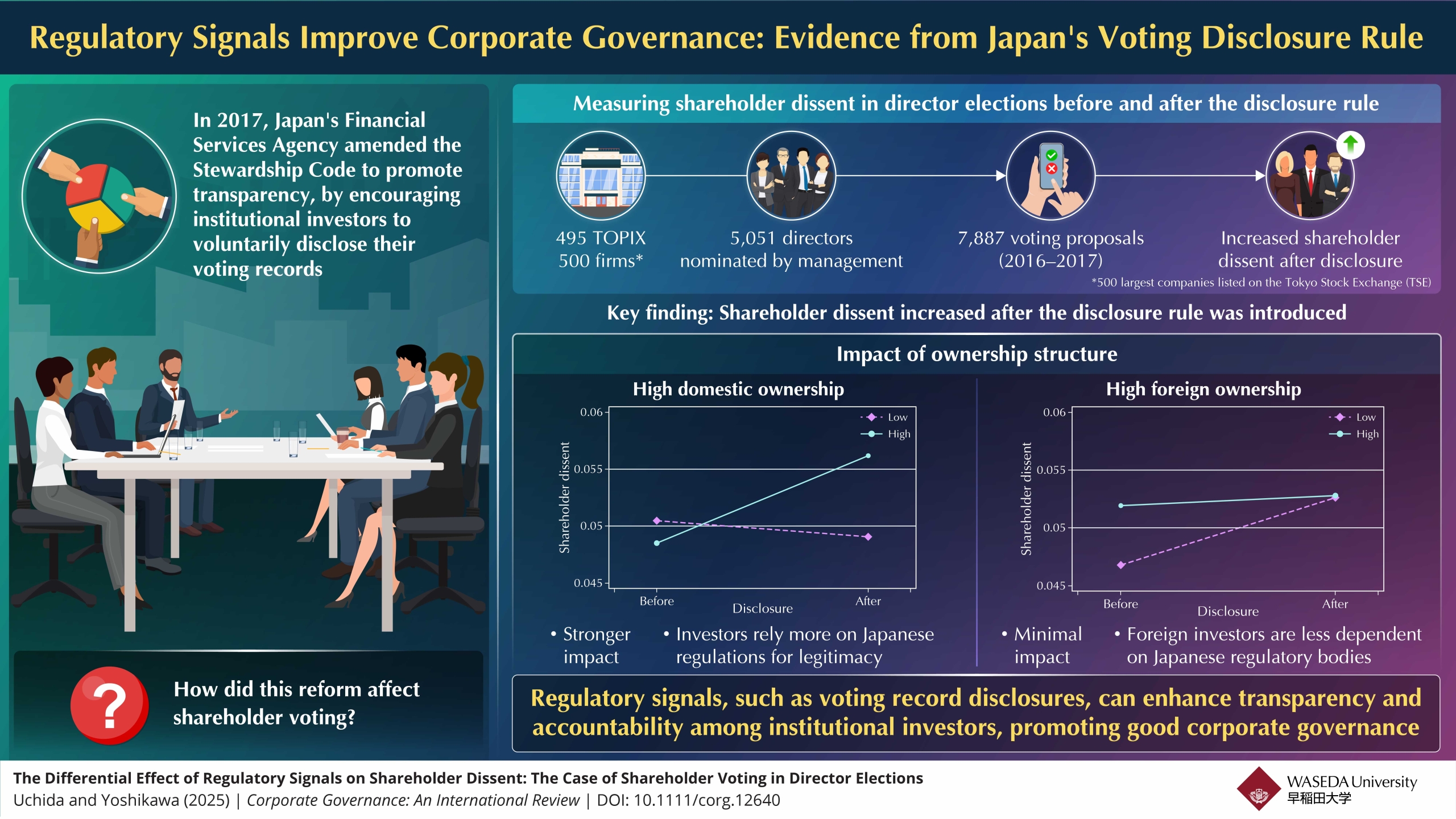Enhancing Shareholder Accountability: Lessons from Japan’s Corporate Governance Reforms
Wed, Feb 19, 2025-
Tags
Enhancing Shareholder Accountability: Lessons from Japan’s Corporate Governance Reforms
Study finds increased shareholder dissent in director elections after Japan’s Stewardship Code amendment on voluntary vote disclosure
Japan’s 2017 Stewardship Code amendment encourages institutional investors to voluntarily disclose their voting records to improve corporate governance. Researchers from Waseda and Keio Universities analyzed 7,887 voting proposals from Japan’s top 500 firms to see how this rule affected shareholder behavior. They found a significant increase in shareholder dissent in director elections among domestic institutional investors following the regulatory reform. The findings highlight that even voluntary regulations can drive meaningful changes in shareholder engagement.

The study found that the voluntary disclosure of institutional investor’s voting records led to increased shareholder dissent in director elections, particularly among domestic investors, demonstrating how transparency regulations can strengthen corporate governance.
Shareholders play a crucial role in corporate governance by voting on key decisions in the companies they invest in. To enhance transparency, regulatory bodies worldwide—such as government agencies and stock exchanges—are increasingly implementing guidelines to hold institutional investors accountable for their voting behavior and ensure they fulfill their fiduciary duties.
A study published in the journal Corporate Governance: An International Review on 22 January 2025 demonstrates that these regulations, even if non-binding, can encourage institutional investors to play a more active role and improve corporate governance. The study, conducted by Professor Toru Yoshikawa from Waseda University and Associate Professor Daisuke Uchida from Keio University, examined how institutional investors responded to the 2017 amendment to Japan’s Stewardship Code, which encouraged them to disclose their voting records.
“The regulatory change in the disclosure of voting records in 2017 encourages institutional investors to engage in corporate governance of their invested firms,” says Yoshikawa. “We were interested in how institutional investors, who are major corporate governance actors, reacted to this change, especially in the differences between domestic investors that were often perceived as passive in their corporate governance role and foreign investors that tend to be more active.”
To examine the impact of the regulatory change on shareholder voting, the researchers analyzed 7,887 voting proposals, covering 5,051 directors from 495 TOPIX 500 firms and the top 500 companies on the Tokyo Stock Exchange. Director candidates are recommended by the company’s board, and historically, domestic Japanese institutional investors often supported these nominees to maintain good relationships with the companies they invested in. However, after the disclosure rule took effect, the study found a significant increase in shareholder dissent in director elections.
This shift was especially noticeable in companies with high domestic institutional ownership, while companies with more foreign institutional investors saw little to no change in voting patterns. Moreover, shareholder dissent against board-recommended directors was strongest when directors were seen as underperforming or unqualified. “Prior studies show that foreign investors have different objectives from domestic investors, and they tend to pay greater attention to the corporate governance of their invested firms. However, our study shows that domestic investors more strongly reacted to the regulatory change on disclosure of voting records than foreign investors; domestic investors started to cast more dissenting votes on director candidates at general shareholders’ meetings,” says Yoshikawa.
The researchers explain that domestic institutional investors—such as local banks, trust banks, and insurance companies—are more likely to respond to local regulations because they rely on local regulatory bodies for legitimacy, whereas foreign institutional investors, who often adhere to international standards, are less influenced by domestic regulations. “Our theory and findings show that domestic institutional investors tend to diverge from foreign institutional investors in response to regulatory signals due to their different levels of dependence on the legitimacy conferred by regulatory bodies, even though they all fall under the same label of institutional investors. This suggests that shareholder preferences are not only heterogeneous but also mutable over time,” says Yoshikawa.
The increased accountability in shareholder voting following Japan’s disclosure rule demonstrates that regulatory reforms can improve corporate governance. The findings can serve as a blueprint for implementing regulatory measures in other countries in Asia that are transitioning to Western-style corporate governance systems.
Reference
Title of original paper: The Differential Effect of Regulatory Signals on Shareholder Dissent: The Case of Shareholder Voting in Director Elections
DOI: 10.1111/corg.12640
Journal: Corporate Governance: An International Review
Article Publication Date: 22 January 2025
Authors: Daisuke Uchida1 and Toru Yoshikawa2
Affiliations:
1.Faculty of Business and Commerce, Keio University, Tokyo
2. School of Social Sciences, Waseda University, Tokyo














